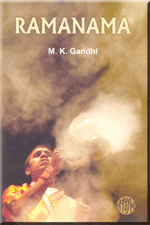
P.O. SEVAGRAM, DIST.WARDHA 442102, MS, INDIA. Phone: 91-7152-284753
FOUNDED BY MAHATMA GANDHI IN 1936
Ramanama

RAMANAMA
Written by :
M. K. Gandhi
Table of Contents
- A Good Seed Sown
- The Staff of Life
- Our Only Help
- Ramanama and National Service
- Seek His Help
- Beauty of Repetition
- Spiritual Practices
- A Sure Aid
- Rediculing Ramanama
- Ramanama and Charms
- My Rama
- Who is Rama?
- Rama - The Son of Dasharath
- Who and Where is God?
- Ramanama and Nature Cure
- Nature Cure Treatment
- Ramanama - The Infallible Remedy
- Ramanama in Nature Cure
- Sovereign Remedy
- Ayurveda and Nature Cure
- At Uruli Kanchan
- Nature Cure in Kanchangaon
- Nature Cure For The Poor
- Nature Cure and Modern Treatment
- Learning From Europe
- Laws of Nature
- Faith Cure v. Ramanama
- Confusion About Ramanama
- A Hard Case
- Towards Realization
- From After-Prayer Discourse
- A Thought For The Day
- Two Letters
- Question Box
- Addendum
- Non-English Words with Meanings
About This Book
Written by :M. K. Gandhi
First Edition : 5,000 copies, June 1949
Total : 54,000 copies
I.S.B.N :81-7229-095-0
Printed and Published by : Jitendra T. Desai,
Navajivan Mudranalaya,
Ahmedabad - 380 014,
India.
© Navajivan Trust, 1949
Download
Chapter-1 : A Good Seed Sown
From my sixth or seventh year up to my sixteenth I was at school, being
taught all sorts of things except religion. I may say that I failed to
get from the teachers what they could have given me without any effort
on their part. And yet I kept on picking up things here and there from
my surroundings. The term religion I am using in its broadest
sense, meaning thereby self-realization or knowledge of self.
Being born in the Vaishnava faith, I had often to go to the haveli.
But it never appealed to me. I did not like its glitter and pomp. Also I
heard rumours of immorality being practised there, and lost all interest
in it. Hence, I could gain nothing from the haveli.
But what I failed to get there I obtained from my nurse, an old servant
of the family, whose affection for me I still recall. There was in me a
fear of ghosts and spirits. Rambha, for that was her name, suggested, as
a remedy for this fear, the repetition of Ramanama. I had more faith in
her than in her remedy, and so at a tender age I began repeating
Ramanama to cure my fear of ghosts and spirits. This was, of course,
shortlived; but the good seed sown in childhood was not sown in vain. I
think it is due to the seed sown by that good woman Rambha that today
Ramanama is an infallible remedy for me.
What left a deep impression on me was the reading of the Ramayana
before my father. During part of his illness my father was in Porbandar.
There every evening he used to listen to the Ramayana. The reader
was a great devotee of Rama — Ladha Maharaj of Bileshwar. It was said of
him that he cured himself of his leprosy not by any medicine, but by
applying to the affected parts bilva leaves which had been cast
away after being offered to the image of Mahadeva in Bileshwar Temple,
and by the regular repetition of Ramanama. His faith, it was said, had
made him whole. This may or may not be true. We, at any rate, believed
the story. And it is a fact that when Ladlha Maharaj began his reading
of the Ramayana his body was entirely free from leprosy. He had a
melodious voice. He would sing the dohas (couplets) and
chopais (quatrains), and explain them, losing himself in the
discourse and carrying his listeners along with him. I must have been
thirteen at that time but I quite remember being enraptured by his
reading. That laid the foundation of my deep devotion to the
Ramayana. Today I regard the Ramayana of Tulsidas as the
greatest book in all devotional literature.